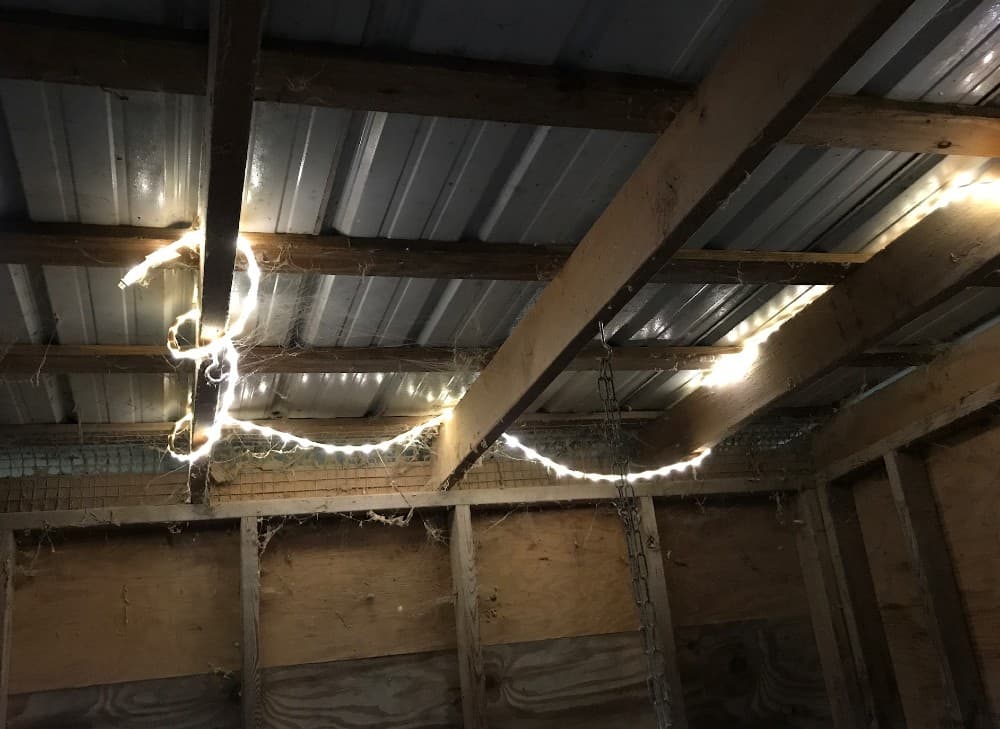Should You Light Your Chicken Coop?
Inside: This post explains how lighting a chicken coop can be done safely if the backyard chicken keeper chooses to provide supplemental light during the winter.
Are you tired of feeding your chickens all winter only to have them go on strike and not lay eggs? Despite what many people think, the cold temperatures are not what stops chickens from laying.
Most chickens actually prefer cooler weather over the hot summer months. The main reason chickens quit laying eggs during the depths of winter is usually a lack of light exposure.
Eggs are actually a seasonal food. Hens lay the majority of their eggs in early spring. That’s why deviled eggs are so common around Easter.
But we have been so used to buying eggs on the store shelves whenever we like that most people aren’t aware of the laying cycle of a chicken.
But lighting your chicken coop is a matter of personal preference. Some chicken keepers prefer to give their chickens a rest from laying eggs over the winter.
Others don’t want to resort to store-bought eggs, so providing extra hours of daylight in the form of artificial lighting may be something you want to think about. This post shares the pros and cons of lighting a chicken coop during the winter so you can make the best decision for your laying hens.

Affiliate Disclosure: Please note that some of the links in this article may be affiliate links and I may receive a small commission if you purchase something through a link. It will not change your cost. As an Amazon Associate, I earn from qualifying purchases. For more information, see my disclosures page.)
Why Would You Want to Light A Chicken Coop?
Hens need approximately 14 hours of light a day to lay an egg. The sun stimulates the pituitary gland of the chicken.
This in turn stimulates the hen’s ovaries to release an egg. As the days get shorter, the pituitary gland receives less sunlight so the hens naturally lay less. Adding a light to your coop can provide extra light so your hens lay more eggs.
Another reason you might choose to light your chicken coop is that lighting a chicken coop can actually improve your chicken’s health. If your chickens are kept indoors most of the day because of the weather, they won’t receive much light at all.
Think of how you feel during the coldest, darkest days of winter when you don’t see as much sunlight. (They call it seasonal affective disorder (SAD) for a reason!) And just like humans, chickens benefit from the added light too.
Tools You Need to Light Your Coop
A Light, But Not Just Any Light
Choosing a safe chicken coop light is the responsibility of the chicken owner.
If you decide to light your coop, you want to do it safely. I do NOT recommend heat lamps. They are extremely dangerous. And in all but the most extreme locations, chickens don’t need additional heat anyway.
I really didn’t feel comfortable using a regular light bulb fixture either. Chickens can and will fly, and I want to know “my girls” are safe.
So I decided to use a slightly unconventional item to light my coop-LED Rope Lights. These lights stay cool and the chickens can’t get to the bulbs or the wires.
My coop has rafters, so I was able to wind the lights through the rafters very easily.
If you choose to use incandescent bulbs or fluorescent lighting, be sure that the light fixtures are attached securely to your coop. Additionally, make sure they have some type of metal cover over them so the chickens can’t get to the bulb.

A Timer
The second thing you will need is an outdoor timer. When lighting your coop, you need to add the light to the early morning hours, not the evening hours.
Chickens do not see well in the dark. If you suddenly shut off the coop light at night, your chickens may not be able to find their way to the roost posts in the evening.
The light also needs to come on and go off at the same time each day (unless you are using the schedule outlined below to get to the 14 – 16 hour window of daylight). Consistency is the key to preventing problems.
And since the coop needs to be lit in the morning, that means setting a timer or getting up SUPER early each and every day. (Yes, including weekends!) I’m an early bird, but not THAT early! So an inexpensive timer is definitely your best option.
(I found this set of rope lights on Amazon that already has a timer included!)
No Electricity? I’ve Got a Solution
So what if your coop doesn’t have electricity? Mine doesn’t. A heavy-duty outdoor extension cord run to your coop should work just fine, provided you have an outdoor outlet on your house.
This has worked fine for me for years. Just be sure you remove it before mowing your lawn.
How to Light A Chicken Coop in the Winter
How you go about lighting a chicken coop during the dark winter months matters. First, the light needs to be added in the morning hours. That’s why the timer is a necessity.
It is better to wait until after your chicken’s annual molt before starting to light your coop. Yes, this may mean a month or so with no eggs, but not allowing them to molt when they normally do, can cause them to molt later when it is colder. (No feathers during the winter means cold and unhappy chickens.)
So once your chickens have molted, you want to provide them with between 14 and 16 hours of light each day. This can be a combination of sunlight and supplemental light.
If your days are already shorter than 14 hours, it is best to gradually acclimate them to the additional light. Start off with setting the timer to turn the light source on 30 minutes before the sun comes up. Leave it at that time for a week.
The next week back it up another 30 minutes so the timer is now turning on the light 1 hour before sunrise. Keep backing up the time each week until you have 14-16 hours of light each day.
If your chickens go outdoors or your coop has lots of windows, it’s a good idea to have the timer turn the light off once the sun is up.
If they tend to stay indoors, it might be best to leave it on all day. However, be sure to turn the light off early in the evening well before dusk.
This allows the chickens to find their roosts before dark. There is no need to go beyond 17 hours of daylight each day. Doing so can actually harm your chickens.
It may take a few weeks before you see your hen’s supply of eggs increasing.
Plan to use the lights all winter long. If you suddenly stop lighting your chicken coop, (or forget to turn the lights on for several mornings) you will likely throw your chickens into a molt. Molting will also cause your chicken to stop laying eggs again.
Once the natural daylight hours exceed 14 hours, you can remove the light from your chicken coop.

A Few Notes About Using Supplemental Lighting in Your Chicken Coop
- Lighting your coop will not shorten the number of eggs your hen will lay over her lifetime. When a chick is born, she carries all the eggs she will ever lay.
- Lighting the coop will not affect the quality of the eggs your chickens lay. If you notice a decline in quality, it is most likely due to the fact that they are foraging less because there are less bugs and grass to feed on.
- It has not been proven that lighting a chicken coop will shorten your hen’s life. Many experts cite this as a reason not to light the coop, but so far, there have been no studies that definitively prove that lighting your coop shortens a chicken’s lifespan.
- Do NOT use a heat lamp! They are HUGE fire hazards. You can read more about why I don’t like heat lamps and what to use instead in my post about raising chicks safely.
- Do not provide supplemental lighting for any chickens that are less than 20 weeks of age. Providing light too early CAN decrease their lifespan.
My Personal Philosophy
While many backyard chicken keepers prefer to give their hens a break and view eggs as a seasonal product, I enjoy having eggs for my holiday baking. (And breakfast! Who am I kidding?)
So if I didn’t light my coop, I would have to buy eggs from commercial egg producers. I personally don’t feel that buying store-bought eggs is really a better option.
Most hens in commercial operations are subject to indoor lighting anyway. My hens are well taken care of throughout the year, so I do what I can to encourage them to lay all winter long.
Ultimately, it is your choice whether to provide supplemental lighting in your chicken coop during the winter. So while there is considerable debate surrounding giving your chickens extra hours of light, I feel that each backyard chicken keeper needs to weigh the pros and cons and decide for themselves what is best for their flock. Lighting your coop is a personal choice.
If you keep chickens, I would love to know what you’ve chosen to do and why. Leave a (polite) comment below. (Comments attacking anyone’s choice WILL be deleted!)
Related Posts
- Ways to Help Your Molting Chickens
- How to Prepare Your Chickens for the Winter
- How to Protect Your Flock from Predators

Meet Julie
I’m a farm girl born and bred in North Carolina. I’ve been growing a vegetable garden for over 20 years (and helping my Mom grow hers even longer). I’ve been raising chickens in my bathtub and backyard for 12+ years. I believe that homegrown food can be made simple. Let’s get started.



What a fabulous way to get fresh eggs all year. Four of my six hens have molted so I will be putting in the rope light this week:) I love you are a fellow North Carolinian. So glad I found your posts. Best of luck with the new calves. Hope you have Happy Holidays. Stay safe.
Thank you so much! It truly is hard to go back to store-bought eggs after having fresh eggs.